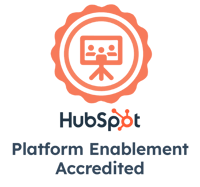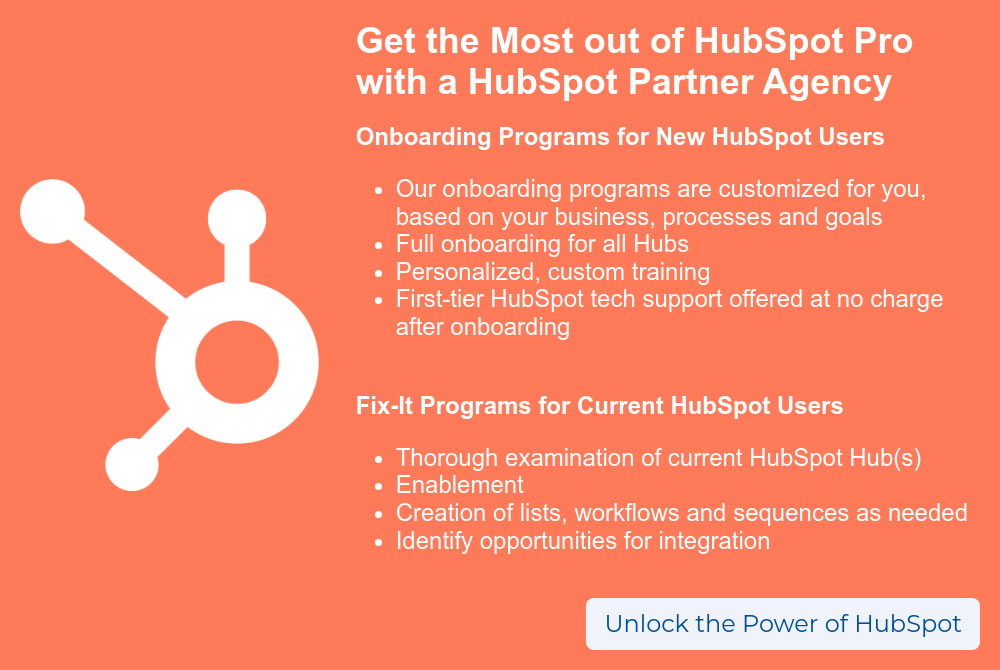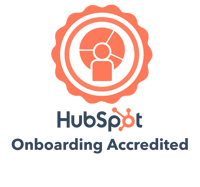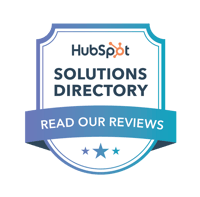Customer service teams need a tool that strikes the perfect balance between "automated enough to make CS team's lives easier" and "personalized enough that customers feel they are getting a tailored experience." Two popular customer service tools achieve this balance: HubSpot Service Hub and Zendesk.
Both Service Hub and Zendesk offer a wide variety of tools created with customer service teams in mind, but they have their differences. Whether you already use one of these tools, use a different customer service tool, or are looking to add to your tech stack, this comparison guide should help decide if HubSpot Service Hub or Zendesk is better for your organization.
Quick disclaimer: BizzyWeb is a HubSpot Diamond Partner, but we aren't obligated to promote HubSpot over Zendesk. Both tools are effective customer management tools, this article is just intended to help compare the two!
Quick Comparison - Zendesk vs. Service Hub
What is HubSpot? What is HubSpot Service Hub?
HubSpot is a suite of software tools for marketing, contact management, sales, service, billing and web design. It all begins with the free customer relationship management system (CRM). From there, customers can choose any or all of the hubs they need to unlock additional features.
As the name implies, the Service Hub is a software system with features designed around common customer service tasks and needs. The core functionalities of Service Hub include a ticketing system, a knowledge base/chatbot, customer feedback surveys and reusable email snippets (similar to Zendesk's pre-defined responses).
Users interested in Service Hub can add it to their HubSpot subscription if they use other hubs (Marketing, Sales, Content, etc.), or they can choose to only purchase Service Hub if they don't need the other tools HubSpot offers. Either way, you get HubSpot's free CRM.
What is Zendesk?
Zendesk is customer service software, full-stop. Its core function is to streamline operations for customer service representatives. Zendesk offers a few different levels, but all levels include a ticketing system, omni-channel communications and reusable pre-defined responses. At the higher levels, there are additional features like a self-service customer portal, multilanguage support and customer satisfaction surveys.
Because Zendesk is primarily customer service software, it can function as a de facto CRM to store contact information, but that's not its intended purpose. Their CRM—Zendesk Sell—is an add-on that comes with an additional monthly cost.
How Do They Compare in Pricing?
Both Zendesk and HubSpot Service Hub are offered at several different tiers, and pricing is based on the number of agents (or seats, in HubSpot terms) that you need to purchase. Pricing is relatively similar between Service Hub and Zendesk. HubSpot starts at a lower cost of $20/month per seat at the Starter Level (compared to Zendesk's $55/mo per seat starter for a similar software offering). However, as the tiers increase both have their pricing quirks (ex: HubSpot's Enterprise level is more per month than Zendesk's, but both tools' Pro levels are roughly the same price).
When comparing, it's better to consider what's included with each and what you want to do with the tool rather than strictly looking at price.

When Comparing Service Hub vs. Zendesk, Ask Yourself....
Is cross-team functionality important?
This is arguably the biggest deciding factor for most businesses we work with at BizzyWeb. With a tool like Zendesk, your customer service team is much more siloed into one tool. They can use anything they have access to within Zendesk, but without additional integrations and set up, they may be cut off from useful context from other tools or business data. This also means your non-customer service teams are locked out of information and activity that transpires in Zendesk.
For example, if a contact already exists in Salesforce, their data won't automatically sync over to Zendesk without setting up integrations. The customer service team may miss helpful information and insights about a contact from the sales team. This also is true in reverse - if Sales doesn't use Zendesk, they won't have access to valuable information from the customer service team that can help in sales conversations, such as renewing a contract. It's typically not sustainable or reasonable to ask a customer service team to also manually export and update information into another CRM.
Likewise, if a customer service rep needs to send contacts to specific pages, blogs and other content assets that don't live within Zendesk, those integrations will need to be set up beforehand. As new content is added, the marketing team, development team, and/or service teams will all need to update information in Zendesk.
With HubSpot, everything exists in one place. Even with just the standard CRM and Service Hub portal, your organization gains access to a centralized database. Information and activities from the Service Hub are automatically updated in the CRM, so everyone has access to what they need. As the Marketing Team updates their assets, customer service reps can reference the latest versions.
Do you already use other HubSpot Hubs?
Everything in the previous section is just with Service Hub and the standard CRM. If you use more than one Hub, you can seamlessly synthesize cross-team actions and do some seriously cool stuff. For example...
- Have an organized and constantly updated marketing library of blogs and landing pages so customer service teams can easily search based on a subject matter or campaign, and find content to send to clients.
- Automate hand-off between sales and customer service without any hiccups internally or externally.
- Create a referral system that runs automatically and sends real-time data to sales.
That's just the tip of the iceberg. You can explore more on how Service Hub integrates with the other Hubs in our Service Hub Guide. If you already use HubSpot, choosing Service Hub is a smarter option.
However, it can also be a great choice if you're looking to optimize your other core business functionalities by using additional HubSpot tools. If you've been considering a website refresh, need to revamp your sales and marketing alignment, or are just ready to grow, a multi-Hub HubSpot system might be just what you need to hit all your goals.
How much do you want to automate?
Both HubSpot and Zendesk have automation tools - but many of the automation tools within Zendesk require an add-on to your monthly subscription and/or an integration with a third-party tool to work. HubSpot has a boatload of built-in tools that work from day one. These are built on four core components:
- Chatbots & Knowledge Base - Integrate your chatbots and knowledge base to help customers help themselves. The knowledge base is a home for support articles, tutorials and other relevant how-tos. When a customer asks certain questions - or are given a question tree to choose from - the chatbot can pull from your knowledge base to provide answers to common questions.
- Snippets - Snippets are handy text blurbs that can be inserted virtually anywhere within HubSpot, such as in emails, notes or while documenting activities like calls or conversations. For a support team, a snippet might include a frequently used response, links to helpful resources or detailed answers to common customer queries.
- Sequences - Sequences are a powerful blend of automated emails and hands-on tasks arranged in any configuration that suits your teams' needs. This could range from a sequence of entirely automated emails to a couple of manual follow-up calls to any mix in between.
- Workflows - Workflows execute a series of complex actions. The beauty of workflows lies in their flexibility and customization; you can set them up to trigger based on specific customer actions or support ticket statuses. This automation ensures your customers get timely and consistent responses, improving the efficiency of your support process. Additionally, workflows can be integrated with other HubSpot tools, like the Knowledge Base or Feedback Surveys, to provide that full support experience. By leveraging workflows, Customer Support teams can focus more on resolving complex issues and less on repetitive tasks, ultimately leading to improved customer satisfaction and a more productive support team.
HubSpot vs. Zendesk: the tl;dr version
- HubSpot is the better option for businesses looking for a robust customer service solution that integrates with other relevant software, like a CRM, sales software, website and/or marketing tools.
- Zendesk is the better option for organizations that are ok with silo'd customer service interactions, and just need a tool that can handle ticketing and omnichannel communications.
In short, both customer service tools will help your team strike the perfect balance of automation and personalization. The decision between the two ultimately boils down to how you want to use it and how it fits into the greater ecosystem of your tech stack: Would you rather use an all-in-one tool where everything connects or a bunch of different tools that don't speak to each other? For what it's worth, I've always had much greater success with the former.
Get the Most out of HubSpot Pro with a HubSpot Partner Agency
 BizzyWeb is a HubSpot Diamond Partner: we offer full-service HubSpot onboarding, enablement and strategy for all hubs. Our team has over 196 certifications in HubSpot (and constantly growing). No matter what your HubSpot needs are, our team is ready to handle them.
BizzyWeb is a HubSpot Diamond Partner: we offer full-service HubSpot onboarding, enablement and strategy for all hubs. Our team has over 196 certifications in HubSpot (and constantly growing). No matter what your HubSpot needs are, our team is ready to handle them.
Plus, we are the only agency in Minnesota with a Platform Enablement Accreditation from HubSpot - sounds fancy, but it means we're top-notch in making HubSpot work within your business.
BizzyWeb is a Minneapolis-based digital marketing and web design agency that helps companies get the high-quality leads they need to grow and thrive. Our tactics include inbound marketing, SEO, advertising, web design, content creation and sales automation. We are an accredited HubSpot Diamond Partner and we offer full-service HubSpot onboarding, enablement and strategy for new and current users.
.png)




